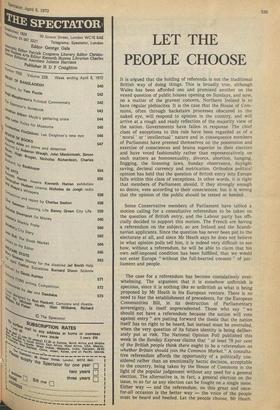LET THE PEOPLE CHOOSE
It is argued that the holding of referenda is not the traditional British way of doing things. This is broadly true, although Wales has been afforded one and promised another on the vexed question of public houses opening on Sundays, and now, on a matter of the gravest concern, Northern Ireland is to have regular plebiscites It is the case that the House of Commons, often through backstairs processes obscured to the naked eye, will respond to opinion in the country, and will arrive at a rough and ready reflection of the majority view of the nation. Governments have fallen in response The chief class of exceptions to this rule have been regarded as of a 'moral ' or ' intellectual ' nature and in consequence members of Parliament have preened themselves on the possession and exercise of consciences and brains superior to their electors and have voted fashionably rather than representatively on such matters as homosexuality, divorce, abortion, hanging, flogging, the licensing laws, Sunday observance, daylight saving, decimal currency and metrication. Orthodox political opinion has held that the question of British entry into Europe falls within this class of exceptions. In other words, it is right that members of Parliament should, if they strongly enough so desire, vote according to their consciences; but it is wrong that the opinion of the public should be tested or heeded.
Some Conservative members of Parliament have tabled a motion calling for a consultative referendum to be taken on the question of British entry, and the Labour party has officially decided to support this motion. The French are having a referendum on the subject, so are Ireland and the Scandinavian applicants. Since the question has never been put to the electorate at all, and since Mr Heath says he does not believe in what opinion polls tell him, it is indeed very difficult to see how, without a referendum, he will be able to claim that his own self-imposed condition has been fulfilled, that we would not enter Europe "without the full-hearted consent" of parliament and people.
The case for a referendum has become cumulatively overwhelming. The argument that it is somehow unBritish is specious, since it is nothing like so unBritish as what is being proposed by Mr Heath in his European venture. There is no need to fear the establishment of precedents, for the European Communities Bill, in its destruction of Parliamentary sovereignty, is itself unprecedented. Those who say "we should not have a referendum because the nation will vote against entry" are putting forward the thesis that the nation itself has no right to be heard, but instead must be overruled, when the very question of its future identity is being deliberately put at risk. The National Opinion Poll published this week in the Sunday Express claims that "at least 78 per cent of the British people think there ought to be a referendum on whether Britain should join the Common Market." A consultative referendum affords the opportunity of a politically considered rather than an emotionally hectic decision, acceptable to the country, being taken by the House of Commons in the light of the popular judgement without any need for a general election. The alternative is, in fact, a general election on the issue, in so far as any election can be fought on a single issue. Either way — and the referendum, on this great and oncefor-all occasion is the better way — the voice of the people must be heard and heeded. Let the people choose, Mr Heath.










































 Previous page
Previous page